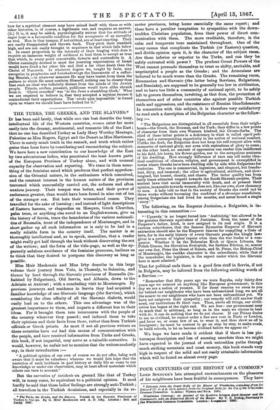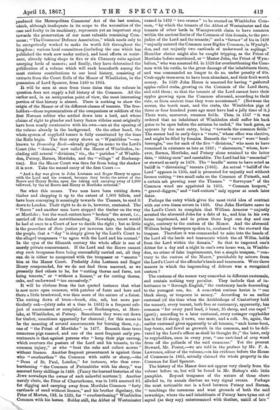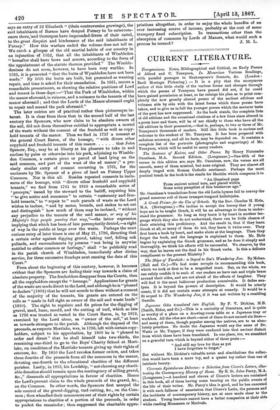FOUR CENTURIES OF THE HISTORY OF A COMMON:* LORD SPENCER'S
late attempted encroachments on the pleasures of his neighbours have been fruitful in consequences. They have
• Extracts from the Court Rolls of the Manor of Wimbledon, extending from let Edward IV. Lo AD. ISei4, selected from the Original !lolls for the Use of the Wine.,ledin Common Committee. L.,ndon: Wyman and Sons. 1866.
• The Turks, the Greeks, cud the Masons. Travels in the Slavonic Provinces or Wimbledon Common : an Account of the Qiestion between Lord Spencer and the Turkey in Fain pe. By G. ilulr Mackenzie and A. P. Irby. Loudon : Bell and Commoners. with an Historical &ads of the Manor. By T. R Bishop, Secretary to produced the Metropolitan Commons' Act of the last session, which, although inadequate in its scope to the necessities of the ease and faulty in its machinery, represents yet an important step towards the preservation of our most valuable remaining Com- mons; The Commons' Defence Association," which needs only to be energetically worked to make its worth felt throughout the kingdom ; various local committees (including the one which has published the work now under notice), and local efforts at resist- ance, already taking shape in five or six Chancery suits against warping lords of manors; and finally, they have determined the publication of a volume which will rank henceforth among the most curious contributions to our local history, consisting of extracts from the Court Rolls of the Manor of Wimbledon, in the possession of Lord Spencer, from 1460 to 1864.
It will be seen at once from these dates that the volume in question does not supply a full history of the Common. All the earlier and, in an antiquarian point of view, the most interesting portion of that history is absent. There is nothing to show the origin of the Manor or of its different classes of tenants. The free- holders—those representatives of the companions or soldiers of the first Norman robber who settled down into a lord, and whose claims of right to plunder and harry Saxon villeins must originally have been nearly coextensive with his own—are at the opening of the volume already in the background. On the other hand, the whole system of copyhold tenure is fully constituted by the time the Rolls begin. The first entry shows us " Wymbildon "—un- known to Domesday Book—already giving its name to the Lord's Court (the "domain," now called the Manor of Wimbledon, in- chiding still several "divisions," viz., the "parishes " of Wimble- don, Putney, Barnes, Mortlake, and the " village " of Roehamp- ton). But the Manor Court was then far from being the shadow it is now Take the second entry of the first Court :— "And a day was given to John Lostman and Roger Henry to agree with the Lord and his counsel, because they broke the arrest of the Reeve and Henry Broke, upon the taking and carrying away of 1,000 tallwood, by the ad Reeve and Henry at Mortlake arrested."
See what this means. Two men have been cutting down timber and chopping it up to the extent of 1,000 billets, and have been conveying it -seemingly towards the Thames, to send it down to London. Their right to do so is, however, contested. The " Reeve" and another man have stopped the timber on the way at Mortlake ; but the wood-cutters have "broken" the arrest, i.e., carried off- the timber notwithstanding. Nowadays, resort would be had at once to a Court of law to decide the right ; but so little is the procedure of State justice yet inwoven into the habits of the people, that a " clay " is 'simply given by the Lord's Court to the alleged trespassers "to agree with the Lord and his counsel." In the eyes of the fifteenth century the whole affair is one of merely private concernment. If the Lord and the Reeve cannot stop such trespasses from being successfully carried out, all they 'can do is either to compound with the trespasser or " amerce " him at the Manor Court. Probably John Lostman and Roger Henry compounded, for we do not find them atnerced, as we presently find others to he, for cutting thorns and furze, not being tenants," or "without a licence," or for cutting thorns, oaks, and underwood " too excessively."
It will be obvious from the last quoted instance that what is now mere open common, with patches of furze and here and there a little brushwood, was then more of the nature of a forest. The cutting down of trees—beech, elm, ash, but more par- ticularly oak—(sixty oaks at a time in 1464) is a frequent sub- ject of amercement or complaint, — at Roehampton, at Mort- lake, at Wimbledon, at Putney. Sometimes they were cut down for timber, sometimes apparently for charcoal ; for this seems to be the meaning of several amercements for burning them, e.g., one of "the Priest of Mortlake" in 1477. Beneath these trees numerous pigs roamed, and one of the most frequent early pre- sentments is that against persons who "keep their pigs unrung, which overturn the pasture of the Lord and his tenants, to the common injury," or who "beat the oaks and collect acorns" without licence. Another frequent presentment is against those who " overburthen " the. Common with cattle or sheep,—the "Dean of St. Paul, London," for instance, who thus over- burthening "the Common of Pattenhithe with his sheep," was amerced forty shillings in 1468. (Fancy the learned historian of the Jews nowadays the owner of such unlawful muttons I) Another unruly cleric, the Prior of Charterhouse, was in 1464 amerced 81. for digging and carrying away from Mortlake Common "forty cartIoada of sand without licence," and his brother dignitary, the Prior of Merton, 12d. in 1525, for " overburthening" Wimbledon Common with his horses. Bolder still, the Abbot of Westminster caused in 1492" two crosses" to be erected on Wimbledon Com- mon, "by which the tenants of the Abbot of Westminster and the tenants of other lords in Wannysworth claim to have common within the ancient limits of the Common of this domain, to the pre- judice of the Lord and the tenants;" and a "farmer" of his in 1499 "unjustly entered the Common near Bigden Common, in Wymbyl- don, and cut unjustly two cartloads of underwood in saplings." Humbler clerics might also be caught tripping, as the Priest of Mortlake before mentioned, or "Master John, the Priest of Wym- belton," who was amerced 8d. in 1528 for overburthening the Cont. mon with his cattle, to the great. damage of the inhabitants there, and was commanded no longer to do so, under penalty of 40s. Crab-apple trees seem to have been abundant, and their fruit worth money. In 1529 John Heron is amerced for having "gathered apples called crabs, growing on the Common of the Lord there, and sold them; so that the tenants of the Lord cannot have their apples growing upon. the Common aforesaid, according to their rate, as from ancient time they were accustomed." (Between the acorns, the beech mast, and the crabs, the Wimbledon pigs of three or four hundred years ago must have had a jolly time of it.) There were, moreover, common fields. Thus, in 1547 "it was ordered that no inhabitant of Wimbledon shall suffer his back gates to be open before the autumn be ended," the back gates, as appears by the next entry, being "towards the common fields." The manor had in early days a "reeve," whose office was elective, and might be filled by females. Beneath the " reeve " were " head- boroughs," one for each of the five "divisions," who seem to have remained in existence as late as 1849; " aleconners," whom, how- ever, Barnes, Mortlake, and Putney alone retained to the latter date, " tithing-men" and constables. The Lord had his "seneschal" or steward as early as 1478. The "beadle" seems to have acted as bailiff in " diatrainiug" tenants (1463). An actual "bailiff of the Lord" appears in 1505, and is presented for unjustly and without licence cutting "two small oaks on the Common of Putaeth, and a certain ash growing near the Thames." " Surveyors " of the Common wood are appointed in 1605. "Common keepers," "gravel-diggers," and " turf -cutters" only appear at much. latee dates.
Perhaps the entry which gives the most vivid idea of contrast with our own, times occurs in 1466. One John Hertlawe came to the Lord's Court to complain that William Armerer "unjustly arrested the aforesaid John for a debt of 4s., and him in his own house imprisoned, and in prison there kept one day and one night, contrary to the custom of the Manor. And the aforesaid William being thereupon spoken to, confessed to the steward the trespass. Therefore it was commanded to seize into the hands of the Lord all the lands and tenements which the ad Willra. holds from the Lord within the domain." So that to impound, one's debtor for a day and a night in one's own house was, in Wimble- don, no crime of false imprisonment, but a simple trespass, "con- trary to the custom of the Manor," punishable by seizure from the Lord's Court of the offender's lands and tenements. Were there manors in which the impounding of debtors was a recognized custom ?
The customs of the manor vary somewhat in different custumaJs, and contain nothing very peculiar. They include that of in.. heritance in "Borough English," the customary lands descending to the youngest son, &c. A somewhat curious heriot is "one black sheep, or tenpence in money." According to an earlier cuatumal (of the time when the Archbishops of Canterbury held the manor), every tenant, both free or customary, apparently, has common "for every yard land, 5 beast, 25 sheep, and one capel " (goat) ; according to a later custunral, every cottager copyholder has it for 25 sheep, 2 cows, one mare, and a colt. So, again, the earlier custumal gives apparently to all tenants, "such horse-boot, hay-boote, and fewel as groweth in the common, and to be deli- vered by the Lord's officer as shall be thought fit ;" the later, only to copyholders, once in every year, "one cart-load of crop wood from off the pollards of the said commons." Yet the present Steward, Mr. Foster,--we are told in the preface by Mr. P. A. Lawrence, editor of the volume,—in his evidence before the House of Commons in 1865, actually claimed the whole property in the Common for Earl Spencer.
The history of the Manor does not appear very clearly from the volume before us, but will be found in Mr. Bishop's able little pamphlet. Beyond trespasses of the nature of those above alluded to, its annals disclose no very signal events. Perhaps the moat noticeable one is a feud between Putney and Barnes, sauehinge the commons and west grounds of both the said townships, where the said inhabitants of Putney have tyme out of mynd (as they say) entercomoned with thother, until of late" says an entry of 32 Elizabeth " (theis controversies growinge), the said inhabitants of Barnes have denyed Putney to be entercom- oners there,'and thereupon have impounded divers of their cattel, to the great disquiet and hinderance of the said inhabitants of Putney." How this warfare ended the volume does not tell us. We catch a glimpse of the old martial habits of our country in an injunction of 1552, that all the inhabitants of Wimbledon "hereafter shall have bows and arrows, according to the form of the appointment of the statute thereon provided." The Wimble- donians do not seem, however, to have been very warlike. In 1595, it is presented "that the butts of Wymbledon have not been made." By 1605 the butts are built, but presented as wanting repair, and time is asked for their emendation. In 1661, occurs a remarkable presentment, as showing the relative positions of Lord and tenant in those days:—" That the Park of Wimbledon, within the manor aforesaid, is ruinous, and a nuisance to the tenants of the manor aforesaid ; and that the Lords of the Manor aforesaid ought to repair and amend the park aforesaid."
The later entries are of practical rather than picturesque in- terest. It is clear from them that in the second half of the last century the Spencers, who now claim to be absolute owners of the soil, did not deem themselves entitled to appropriate a morsel of the waste without the consent of the freehold as well as copy- hold tenants of the manor. Thus we find in 1757 a consent at the general Court Baron, of the homage, "with divers other
copyhold and freehold tenants of this manor that John Spencer, Esq., may be at liberty at his pleasure to take in and enclose by pales or otherwise into his park, adjoining to Wimble- don Common, a certain piece or parcel of land lying on the said common, and part of the wast of the sd manor ;" a pre- cisely similar entry of consent occurring in 1761, for the enclosure by Mr. Spencer of a piece of land on Putney Upper Common. Nor is this all. Besides repeated consents to inclo- surea of the homage, with "divers other freehold and copyhold tenants," we find from 1761 to 1810 a remarkable series of 'precepts,' issued by the steward to the bailiff, requiring him " to give notice and summons" to certain "customary and free- hold tenants," to "repair to" such parcels of waste as the Lord wishes to inclose, "and by metes, bounds, and stakes to set out and distinguish" how much of them may be inclosed, "without any prejudice to the tenants of the said manor, or any of his Majesty's liege people passing that way,"—the latter expression implying that which has been of late peremptorily denied,—a right of way in the public at large over the waste. Perhaps the most curious entry of later times is one of May 21, 1796, directing that a certain order against digging gravel, taking turf, felling oak pollards, and encroachments by persons "not being in anywise entitled to either common or herbage," shall "be publickly read in the parish church of Wimbledon, immediately after divine service, for three successive Sundays next ensuing the date of this Court."
From about the beginning of this century, however, it becomes evident that the Spencers are feeling their way towards a claim of absolute property. The freeholders disappear from the Courts, then all the copyholders except the "homage." Applications for grants of the waste are made direct to the Lord, and although he is "pleased to declare" (1804) that he will not accede to them without a consent of the majority of the tenants, his grants are entered on the rolls as "made in full right as owner of the soil and waste lands" (1810). The right to regulate and fix prices for the digging of gravel, sand, loam, mould, and the cutting of turf, which so late as 1796 was treated as vested in the Court Baron, is, by 1812, exercised by the Lord alone, as "owner of the soil," at least as towards strangers to the parish. Although the disposal of the proceeds, as respects Mortlake, was, in 1796, left with certain copy- holders, subject to his approbation, by 1800 he is "pleased to order and direct" that be shall himself take two-thirds, the remaining one-third to go to the Boys' Charity School at Mort- lake, on condition of the Mortlake tenants giving up their rights of estovers, &c. By 1810 the Lord revokes former orders, and takes three-fourths of the proceeds from all the commons in the manor, devoting one-fourth to the educational charities of the different parishes. Lastly, in 1813, his Lordship, "not choosing any charit- able donation should remain upon the contingency of selling gravel, &c.," disannuls all appropriations in favour of charities. Hence the Lord's present claim to the whole proceeds of the gravel, &c., on the Common. In other words, the Spencers first usurped the sole control of the gravel-digging, turf-cutting, &c., on the Com- mon; then wheedled their commoners out of their rights by certain appropriations to charities of a portion of the proceeds, in order to pocket the remainder ; then suppressed the charitable appro-
priations altogether, in order to enjoy the whole benefits of an ever increasing source of income, probably at the cost of some trumpery fixed subscription. In transactions other than the absorption of commons by Lords of Manors, what would such a
































 Previous page
Previous page